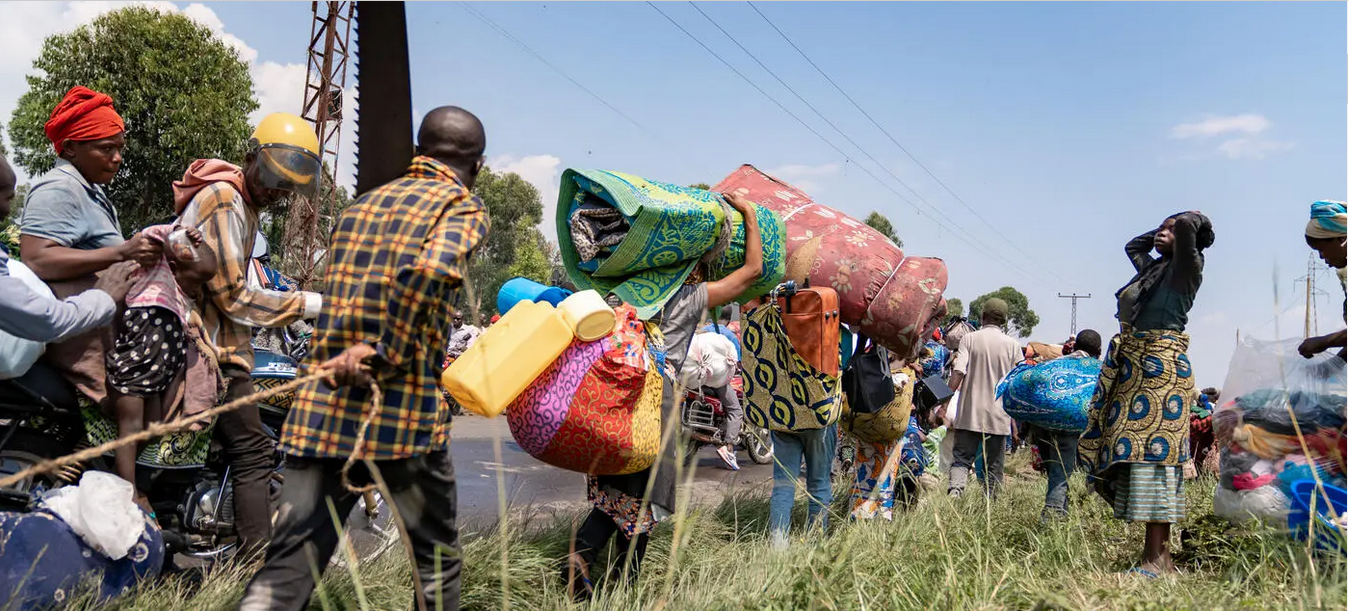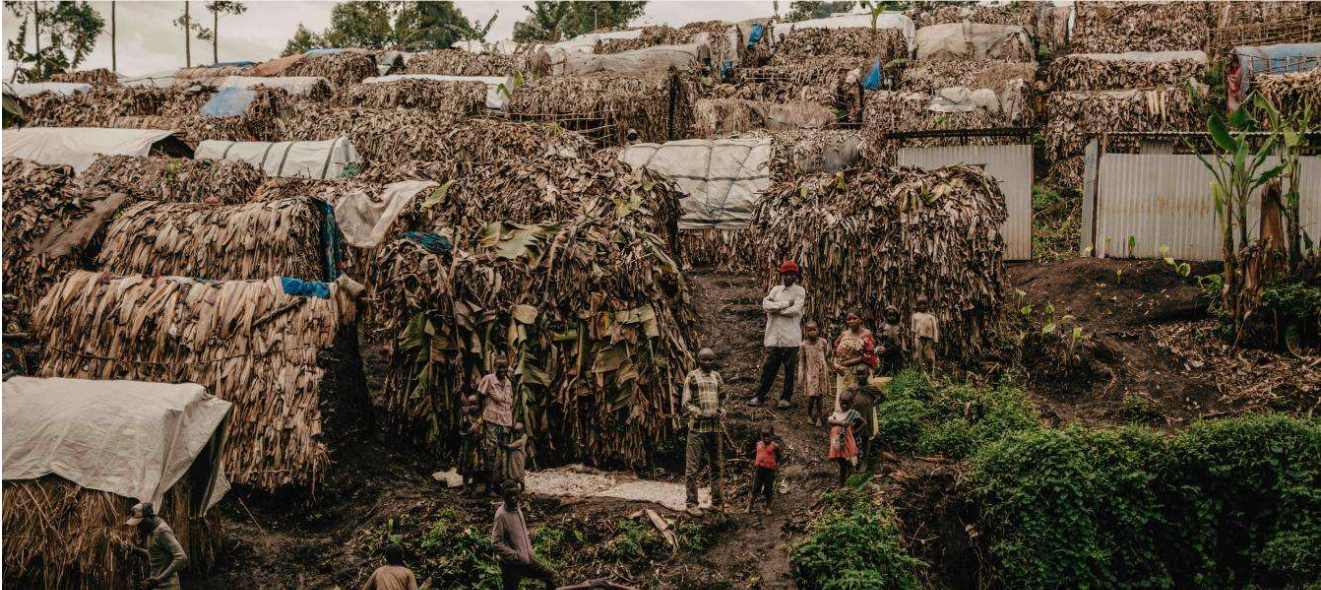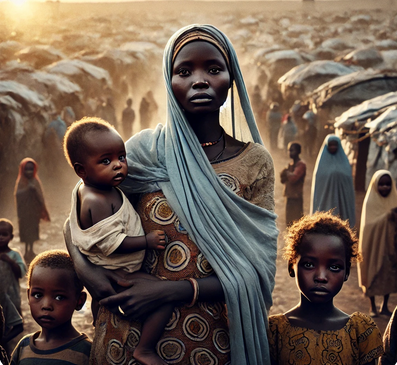Thousands of Families Flee as Violence Ravages Lives in DRC Congo

In the heart of Africa, where the Democratic Republic of Congo (DRC) is teeming with natural beauty and potential, an ongoing humanitarian crisis is shaking the foundations of Masisi Territory. Families, once rooted in the rich lands of the North Kivu province, now find themselves displaced - ripped from their homes by the unrelenting violence between armed groups. With villages deserted, crops left to wither, and livelihoods shattered, the journey for survival becomes an overwhelming burden.
As these families trek towards Goma City, they encounter unimaginable hardships: hunger, disease, and the constant weight of uncertainty. Goma, already facing its own challenges, struggles to absorb this influx of displaced people, leaving many without basic necessities like food, water, and shelter. In a region where the capacity to help is already stretched thin, the situation is teetering on the edge of catastrophe. This is not just a humanitarian crisis; it is a call for action - one that demands the attention and empathy of the international community.
The Crisis in Numbers: A Snapshot of Desperation
The situation in Masisi Territory can only be described as dire. As armed groups continue to clash, the violence drives thousands of families from their homes each week. According to recent reports, nearly 400,000 people have fled their villages in Masisi in the past year alone, and this number is expected to rise if the conflict continues unchecked. These families are fleeing with little more than the clothes on their backs, leaving behind homes and farms that have been the bedrock of their livelihoods for generations.
The displacement of these people has overwhelmed the surrounding regions, especially Goma City, which is already facing its own set of socio-economic challenges. Camps for internally displaced persons (IDPs) are overrun, food supplies are running low, and health services are stretched to the breaking point. Many of these camps lack proper sanitation and access to clean water, exacerbating the risk of disease outbreaks. For these displaced families, the promise of safety in Goma has turned into another chapter of struggle and uncertainty.

People in Goma Camp have resorted to building banana leaves as tents for their "homes" as a result of lacking sufficient resources for better ones
The Human Cost: Stories of Resilience Amid Despair
Behind the staggering numbers are stories of individual lives, families who are trying to hold on to hope amid the chaos. Take the story of Marie, a mother of four who fled her village in the dead of night after armed groups stormed her community. With her children in tow, Marie walked for days through the forests to reach Goma. "We left everything behind - our home, our crops, our animals. I don't know how we will survive now," she says, tears welling in her eyes. For Marie and countless others like her, the future is uncertain.
Yet, amid this despair, there are stories of resilience that shine through. Women in the camps are banding together to create makeshift schools for their children, knowing that education is their only hope for a better future. Farmers are sharing the few seeds they were able to carry with them, hoping to grow enough food to survive. These acts of solidarity reflect the unyielding strength of the human spirit, but they are not enough to sustain the growing needs of the displaced populations.

Amidst the challenges of displacement, Marie and
her children stand resilient, their story reflecting the strength of families
facing an uncertain future. Hope persists, even in the darkest of times.
How You Can Help: Mobilizing Support for Relief Efforts
The situation in Masisi Territory requires urgent action. While local organizations and international NGOs are on the ground, their efforts are hampered by a lack of resources and the sheer scale of the crisis. Here's where you - compassionate individuals, global citizens, and potential sponsors - can make an immediate and life-saving impact.
There are several ways to chip in and help alleviate the suffering:
- Financial Donations: The most immediate need is funding for emergency relief. Your donations can provide displaced families with food, clean water, medicine, and temporary shelter. We estimate that $100 can feed a family of five for a month, and $500 can supply a makeshift clinic with vital medical supplies for an entire week. With $10,000, an entire community of IDPs can receive clean drinking water for a month.
- Medical Supplies and Healthcare: The influx of displaced people has overwhelmed local health facilities, leading to a surge in preventable diseases. Sponsoring healthcare initiatives - such as vaccination drives, mobile clinics, and the provision of mosquito nets - can save countless lives. Every $1,000 raised can support a mobile clinic for a week, providing care for hundreds of people who otherwise would have no access to medical services.
- Sustainable Solutions: Beyond immediate relief, we need to think about long-term support for these communities. Investments in agricultural projects, vocational training, and education can help displaced families rebuild their lives. By donating $5,000, you could help set up a community garden that provides sustainable food sources for 50 families. A donation of $20,000 can fund a vocational training program, equipping women with skills that can generate income and restore dignity to their families.
- Advocacy and Awareness: Even if you're unable to contribute financially, raising awareness about the crisis in Masisi is vital. Share these stories of resilience with your networks, amplify the voices of those in need, and help us bring global attention to this ongoing crisis.
Donation Projections: What We Aim to Achieve
- $100,000: This can provide emergency food, water, and shelter to 10,000 displaced families for a month.
- $250,000: With this funding, we could establish five mobile healthcare units, each serving thousands of people in remote areas for six months.
- $1 million: This ambitious goal would enable us to provide both emergency relief and long - term recovery initiatives, from education to sustainable agriculture projects, reaching over 100,000 people in Masisi Territory.
Conclusion: A Call for Compassion and Action
The crisis in Masisi Territory is a humanitarian emergency that cannot be ignored. Thousands of families are on the brink of survival, and they need our support now more than ever. The stories of resilience, hope, and strength emerging from the displaced communities are a testament to the enduring human spirit, but they cannot rebuild their lives alone.
As we witness this growing crisis, the question is not just whether we can help - but how can we afford not to? Each donation, no matter the size, is a lifeline to a family in need. Together, we can help restore hope to the thousands of displaced people fleeing the violence in Masisi Territory. Let us rise to the occasion and stand in solidarity with the most vulnerable, ensuring that their stories are heard and their futures are protected.